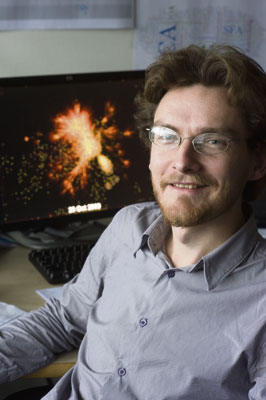Name: Chris Davis (31)
Nationality: US citizen
Supervisor: Professor Gerard Dijkema (faculty of Technology, Policy and Management)
Subject: Examining ways to enable diverse researchers to better understand complex systems spanning many knowledge domains.
br />
Thesis defense: In 18 months
“Researchers should use web technology to do better science. It’s mind-
blowing that Wikipedia surpassed the size of Encyclopedia Britannica in just a few years. Can we connect the scientific world in a similar way? This is badly needed because many of the problems today are beyond the scale of a single mind. Take for instance climate change. You can be the most brilliant engineer, but if you don’t know anything about social science or economics you will not understand what is happening. Can we connect the right pieces of knowledge to better understand what’s happening in the world?
I believe we can. Let me give an example of a successful project using web technology. A year ago I helped a group of industrial ecology students with a project to evaluate eco-industrial parks. These industrial clusters are meant to operate more sustainably than normal industrial parks. The students used a wiki as a research platform, and in only two months this page became the largest resource of information about this topic. Researchers from over 56 countries visited the site! Behind the scenes, advanced Semantic Web technology connects information that’s spread over multiple wiki pages. This makes visualization possible; in this case we created a dynamically generated map of the parks. At a conference where I showed the map, even leading researchers kept on spotting interesting things, something that was impossible when these things were still disguised in 200+ wiki-pages.
This is a cool example about how science benefits from web technology, but I believe this is merely the beginning. I see two big problems with how people do research at the moment. The first one is that they often execute repetitive tasks by hand that computers are more suitable for. Also, people often have to recompile information that others have already gathered. It’s like we want to build a skyscraper, but we keep having to rebuild the bottom floors. There are a lot of tools out there that can really aid science and help us grow something much bigger, but they’re only slowly being adopted. If we want to understand the world, we need to get better at complex data management and the techniques for both extracting data and doing interesting things with it. We’re very lucky, as the technology to achieve this is there already. My question is how can we get people more engaged in it?”
Met ‘When zombies attack! Mathematical modelling of an outbreak of zombie infection’ kreeg een groep Canadese onderzoekers vorig jaar veel aandacht voor hun werk.
Misschien waren ze geïnspireerd door het succes van ‘Pride and Prejudice and Zombies’. Of misschien hadden ze op het jaarlijkse vakgroepsuitje een ‘Night of the Living Dead’-marathon gehouden. In elk geval besloten de onderzoekers hun (nogal saaie) modellen voor de verspreiding van epidemieën eens toe te passen op zombies. Geen gek idee in een vakgebied waar artikelen onsexy namen hebben als ‘Reproduction numbers and sub-threshold endemic equilibria for compartmental models of disease transistor’.
‘When zombies attack!’ begint met de beschrijving van verschillende soorten zombies. Voor hun modellen kiezen de onderzoekers de zombie uit klassieke zombiefilms: hij is ondood, beweegt traag en eet graag mensen. Voor verschillende scenario’s worden differentiaalvergelijkingen opgesteld, Jacobianen berekend en evenwichten bepaald.
De conclusie: bij een uitbraak van zombies zal onze beschaving waarschijnlijk instorten. Met een medicijn om zombies te veranderen in levende mensen, zou er een evenwicht kunnen ontstaan waar zombies en mensen naast elkaar leven. Quarantaine van zombies zou de epidemie kunnen stoppen, maar volgende onderzoekers is dat ‘in de praktijk niet haalbaar’. Prof. Robert Smith? (het vraagteken hoort bij zijn naam) was een van de auteurs en is verbaasd over de lawine aan reacties: “Het was leuk om het artikel te schrijven en meer had ik er niet van verwacht.” Er gebeurde echter van alles. Hij werd gevraagd voor talrijke presentaties en mocht zijn eerste plenaire voordracht geven. Er werden documentaires over hem gemaakt en Smith? geeft nu advies aan scenarioschrijvers over wetenschap in Hollywoodfilms. Ook leverde het artikel hem meer publicaties op in goede tijdschriften.
Wat hij zelf het mooiste vindt is dat hij daarna ook media-aandacht kreeg voor zijn serieuze werk: “Ik had een publicatie in Science over het gevaar van resistentie tegen medicijnen. Dit belangrijke werk kreeg veel publiciteit, de journalisten kenden me van de zombies en wisten dat ik me staande kon houden in een interview.” Smith? noemt het zombie-artikel een enorm voordeel: ”Het enige dat het niet heeft gedaan is direct geld opbrengen, maar de eer en roem zijn meer dan genoeg.”
Voordeel: Levert roem, plenaire voordrachten en publicaties op.
Nadeel: Mensen zullen je vragen of hun belastinggeld hier aan moet worden besteed.



Comments are closed.